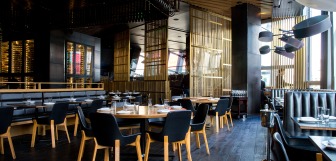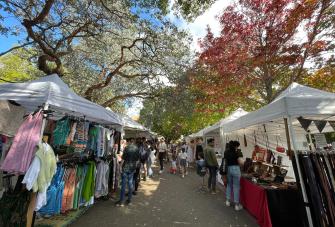Restaurant Sales Forecasting - Revenue Strategy Projections
Welcome to restaurant sales forecasting - where the right numbers can take food businesses from good to great! Accurately predicting future sales is crucial for a successful restaurant business. By mastering this art, you can elevate performance, streamline operations, and boost profits.
Join us in this blog post as we explore the following:
- Why your restaurant sales forecast should not be overlooked
- Factors that can impact your restaurant's sales
- Techniques for accurate restaurant sales forecast
- Using POS technology to improve sales forecasting
Why your restaurant sales forecast should not be overlooked
Sales forecasting refers to the process of estimating and predicting future sales levels and trends for a business or organisation.
As a restaurant owner, you must be familiar with the dynamic and competitive nature of the restaurant industry. To stay on top, you need a clear understanding of your projected sales potential. That's where sales forecasting steps in, guiding you to profitability and operational excellence. Here's why it's crucial:
Strategic decision making
Accurate sales forecasting empowers informed decisions in your restaurant. This lets you control inventory, manage purchases, and avoid waste, striking the perfect balance between satisfying customers and controlling costs. The result? Your profits are maximised.
Effective staff optimisation
Predicting sales accurately helps lower staffing costs at restaurants. If you match the expected demand, you avoid understaffing during peak hours and overstaffing at off-peak times. This ensures satisfactory customer service, while optimising restaurant labour costs.
Menu planning
Predicting sales allows for an unbeatable menu plan that satisfies your customers palates. By studying trends and past data, discover which dishes your customers love and debut new items to meet their desires. Plus, forecasting determines optimal restaurant pricing, ensuring you stay profitable while staying competitive!
Promotions
Sales forecasts are key to planning effective marketing campaigns. By anticipating sales patterns, you can align promotions with demand, boost sales during slower periods, and ensure maximum impact for minimal cost.
Financial planning
Accurate sales forecasting is essential for excellent financial planning as it will affect your restaurant profit margin health. Knowing how much your restaurant will sell helps you create robust financial strategies and secure financing if needed. Above all, it ensures your business's financial health and sustainability.
The restaurant industry operates on tight margins so sale forecasting is key.. Data-driven decisions provide a competitive edge, optimise resources, and keep you ahead. Master sales forecasting to unlock the best of your restaurant and set yourself up for long-term prosperity.
Factors that can impact your restaurant sales
There are various factors, both internal and external, that can influence restaurant sales, impacting your business's performance. To make accurate sales forecasts, it's vital to understand and analyse these factors. Let's explore some crucial elements that affect restaurant sales.
Seasonality
Seasonal changes massively impact restaurant sales projections. Holidays, weather, and tourism all affect how busy a restaurant is. Think about how beachside food joints are packed in summer, while those near ski resorts do the same in winter. Being aware of these fluctuations is essential to prevent any unexpected restaurant sales drops or excess capacity.
Restaurant's location
Your restaurant's location can greatly impact sales. Factors such as foot traffic, proximity to residential or commercial hubs, accessibility, and competition all play a role. Busy city centres or tourist attractions can generate higher sales due to increased customer traffic, while quieter areas rely on loyal customers. Understanding how your location affects sales is essential for accurate forecasting.
Competition
Keeping an eye on your competition is important for your restaurant's sales. Your competitors' cuisine, prices, and unique selling propositions can affect your customers’ loyalties and choices. By monitoring these factors, you can gain valuable insights into market dynamics and adjust your sales forecasts accordingly.
Customer trends and historical sales data
To boost sales, it's crucial to know what your customers want from your restaurant. That means understanding dietary trends and their favourite types of food, plus offering unique dining experiences.
Keep your ear to the ground and send surveys to spot new trends, then use the data to improve your menu. Don't forget to analyse sales at different times and menu items to anticipate trends. Trust historical data to help inform your sales forecasts.
Economic factors
Economic factors like growth, unemployment, and people's spending habits can affect restaurant sales. Sales tend to drop when the economy slumps, because people eat out less. When the economy's good, people have more money to spend, so restaurants might see a boost. Keeping an eye on these factors can help you predict sales.
External events
Local events, festivals, conferences, or concerts can increase restaurant sales. They attract visitors to the area and create a surge in local activity, resulting in higher demand for dining options. Keep track of upcoming events and adjust your sales forecasts to make the most of these opportunities.
To predict restaurant sales and maximise revenue, keep an eye on the factors that affect sales and continually adjust your forecasting strategy. Stay ahead of the competition by making informed decisions based on these dynamics.
Techniques for restaurant sales forecasting
Knowing how crucial restaurant sales forecasting is and the factors that greatly affect it, let's now dive into some exciting techniques that will help you predict the future with confidence. Though we don't possess a crystal ball, we can give you some tried-and-true methods that will boost your restaurant forecasting game.
Analysing past sales patterns
Travel through time and uncover hidden sales patterns with time series analysis -- the perfect tool for any restaurant owner. Analyse historical data to identify seasonal trends and recurring patterns, helping you anticipate future demand and forecast with confidence.
Regression sales analysis
Don't be intimidated by regression analysis! It simply helps you understand how factors like price, promotions, and weather affect your sales [1]. By analysing historical data and using statistical models, it quantifies the impact of these factors on customer behaviour. Think of it as connecting the dots between your actions and their effects.
Smoothing techniques for sales data analysis
With smoothing techniques, exploring sales data is smooth sailing. These methods, such as moving averages and weighted averages, can clear up fluctuations and reveal trends. You'll spot patterns and make better predictions. It's like developing a photo to reveal the big picture.
Expert opinion
Seasoned restaurant industry professionals have valuable insights to offer about forecasting. Don't miss out on the opportunity to learn from experts by seeking input from consultants and other staff. They've witnessed the trends and successes, tasted them and can provide guidance based on their own experiences. So, don't hesitate to tap into their expertise!
Customers feedback
Your customers possess valuable information, and mining their thoughts and preferences can be a sales goldmine! Surveys, feedback and customer data analysis can provide insight into their desires, likes and dislikes. By understanding changing trends, diets and preferences, you can tailor your offerings and make accurate predictions about future demand.
Competitive analysis
Competition is tough in the restaurant industry, and that's why keeping tabs on what your competitors are up to is crucial. Checking out their menus, pricing, promos, and reviews is key. These insights can help you stay ahead of changing trends and anticipate shifts in customer behaviour. It's like having a radar that helps you stay on top of your game!
Forecasting is both an art and science. It involves data analysis, intuition, and adaptability. Embrace these techniques, experiment, and refine your methods over time. With each forecast, you'll gain insight and increase your sales prediction ability. So, grab your forecasting hat, gather data, and set sail to exciting revenue predictions!
Using POS technology to improve sales forecasting
Technology is a game-changer for restaurants! With restaurant POS (Point of Sale) systems, forecasting restaurant sales become a breeze. Along with efficient payment processing, these systems offer valuable insights that can revolutionise your sales forecast accuracy. Let's explore the benefits of leveraging POS technology!
Accurate sales data collection
A restaurant pos system captures and record all of your restaurant transactions, giving you valuable data on customer orders, peak times, popular dishes, and prices. Combine this info with your forecasting analysis for informed decision-making and more accurate sales predictions.
Real-time sales tracking
No more guessing games. With POS tech, you can track actual sales in real-time and access up-to-the-minute data on performance. Keep an eye on sales figures, trends, and patterns, so you can quickly adjust and make proactive decisions.
With real-time data, you'll be able to spot opportunities and make quick improvements, whether it's taking advantage of sudden surges in sales or dealing with slow days.
Integration with inventory management
Efficient inventory management is vital for maintaining profitability and avoiding stockouts or excess inventory. A pos system can integrate seamlessly with inventory management software, enabling you to track stock levels, monitor ingredient usage, and identify ordering patterns.
By analysing sales data alongside inventory data, you can optimise inventory projections, reduce waste, and ensure you always have the right ingredients on hand. This integration between sales forecasting and inventory management promotes cost control and operational efficiency.
Enhanced reporting and analytics
POS technology can provide customised reports for your specific needs, revealing vital insights into sales trends, customer behavior, and more. These analytics can identify opportunities for revenue growth and help your business make data-driven decisions with confidence.
Customer loyalty integrations to boost sales forecast
Boost customer retention by integrating your POS system with customer loyalty programs. This incentivises repeat business by offering discounts or special offers to reward loyal customers. Plus, incorporating customer loyalty into your sales forecasting can help you grow your business sustainably.
Continuous improvement and adaptability
Your POS system evolves with your business to ensure that it continues to add value. The system can gather more data and you can refine your techniques for better forecasting. Check your sales forecasts regularly against actual performance to see how accurate your predictions are.
Adjust your forecasting model as needed to make sure that your predictions become more precise over time, so you can make better decisions and see improved financial outcomes. It's an ongoing improvement cycle that can lead to great results!
Point of sale technology is transforming the way restaurants do sales forecasting. By using POS data, real-time tracking, and integrating with inventory management, you can unleash the full potential of your forecasting efforts. And with advanced reporting capabilities, you can really stay on top of everything. Don't let the possibilities of POS technology pass you by - try it today and see your forecasting accuracy and operational efficiency take off!
Final thoughts
Forecast sales are a vital tool for achieving success in business. It helps restaurant owners become more profitable and efficient by giving you insights into future sales.
By harnessing the power of data analysis, industry insights, and technological advancements, restaurant owners and managers can make informed decisions that drive profitability, customer satisfaction, and long-term success. In short, it's your secret weapon to operational excellence.




